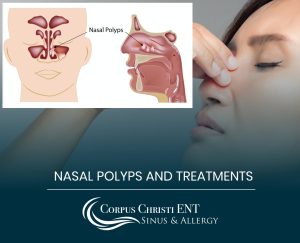
Nasal polyps are soft, sac-like growths arising from the lining of the nose or sinuses.
Nasal polyps can grow anywhere on the lining of the nose or the sinuses. They often grow where the sinuses open into the nasal cavity. Small polyps may not cause any problems. Large polyps can block your sinuses or nasal airway.
Nasal polyps are not cancer. They seem to grow due to long-term swelling and irritation in the nose from allergies, asthma, or infection.
If you have any of the following conditions, you may be more likely to get nasal polyps:
- Aspirin sensitivity
- Asthma
- Long-term (chronic) sinus infections
- Cystic fibrosis
- Allergic rhinitis
Symptoms
If you have small polyps, you may not have any symptoms. If polyps block nasal passages then the nasal airway becomes congested or obstructed. If polyps block sinus openings, a sinus infection can develop.
Symptoms include:
- Runny nose
- Stuffed up nose
- Sneezing
- Feeling like your nose is blocked
- Loss of smell
- Loss of taste
- Headache and pain if you also have a sinus infection
- With polyps, you may feel like you always have a head cold.
Diagnosis
Dr. Weiss will thoroughly evaluate your nasal and sinus cavities during your consultation. He may perform an in office CT scan of your sinuses or a sinus endoscopy, or both.
Treatment
- Medicines help relieve symptoms, but rarely get rid of nasal polyps.
- Nasal steroid sprays shrink polyps. They help clear blocked nasal passages and runny nose. Symptoms return if treatment is stopped.
- Corticosteroids may also shrink polyps, and can reduce swelling and nasal congestion. The effect lasts a few weeks to months in most cases.
- Allergy medicines can help prevent polyps from growing back.
- Antibiotics can treat a sinus infection caused by bacteria. They can’t treat polyps.
If medicines don’t work, or you have very large polyps, you may need surgery to remove them.
Endoscopic sinus surgery is often used to treat polyps. Dr. Weiss routinely performs this surgery in an outpatient setting. Sometimes, polyps come back, even after surgery. Ongoing medical management is required to prevent their reoccurrence.